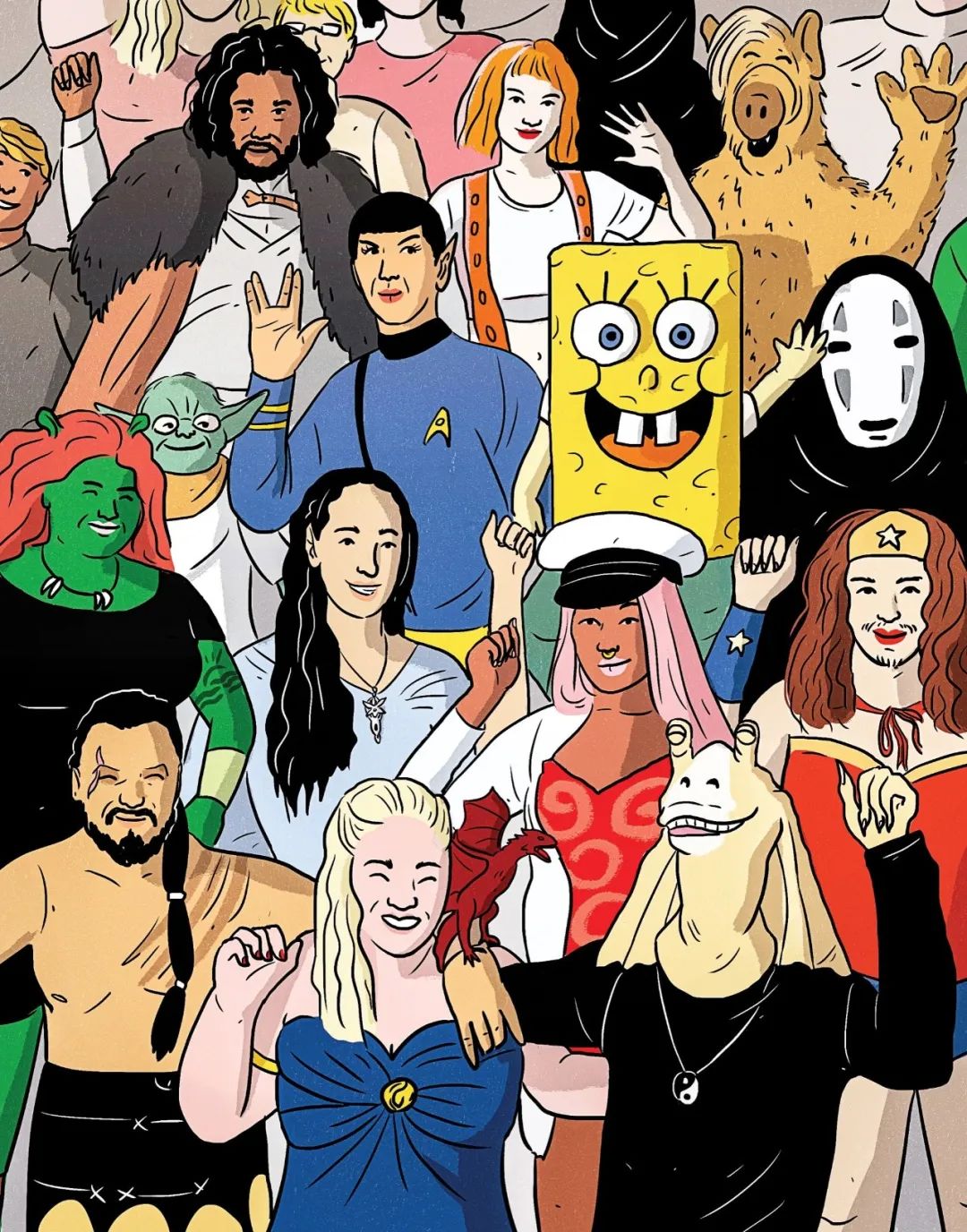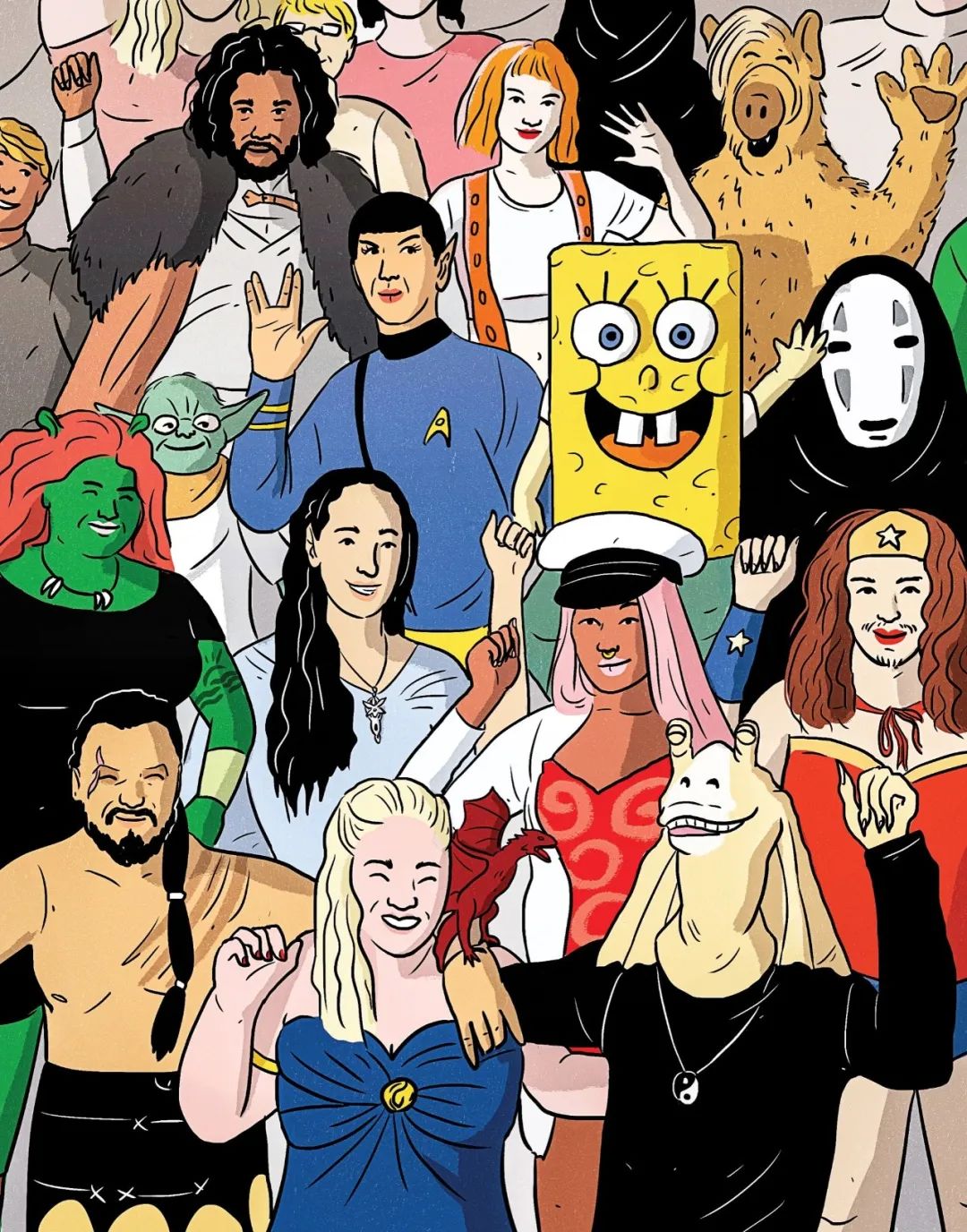
原标题:Superfans: A Love Story
原作者:Michael Schulman
原刊于:New Yorkr
转载未获授权,如有授权请联系删除。
来自于《纽约客》的很长的一篇文章,由于推送的字数限制,部分描述的内容截屏呈现
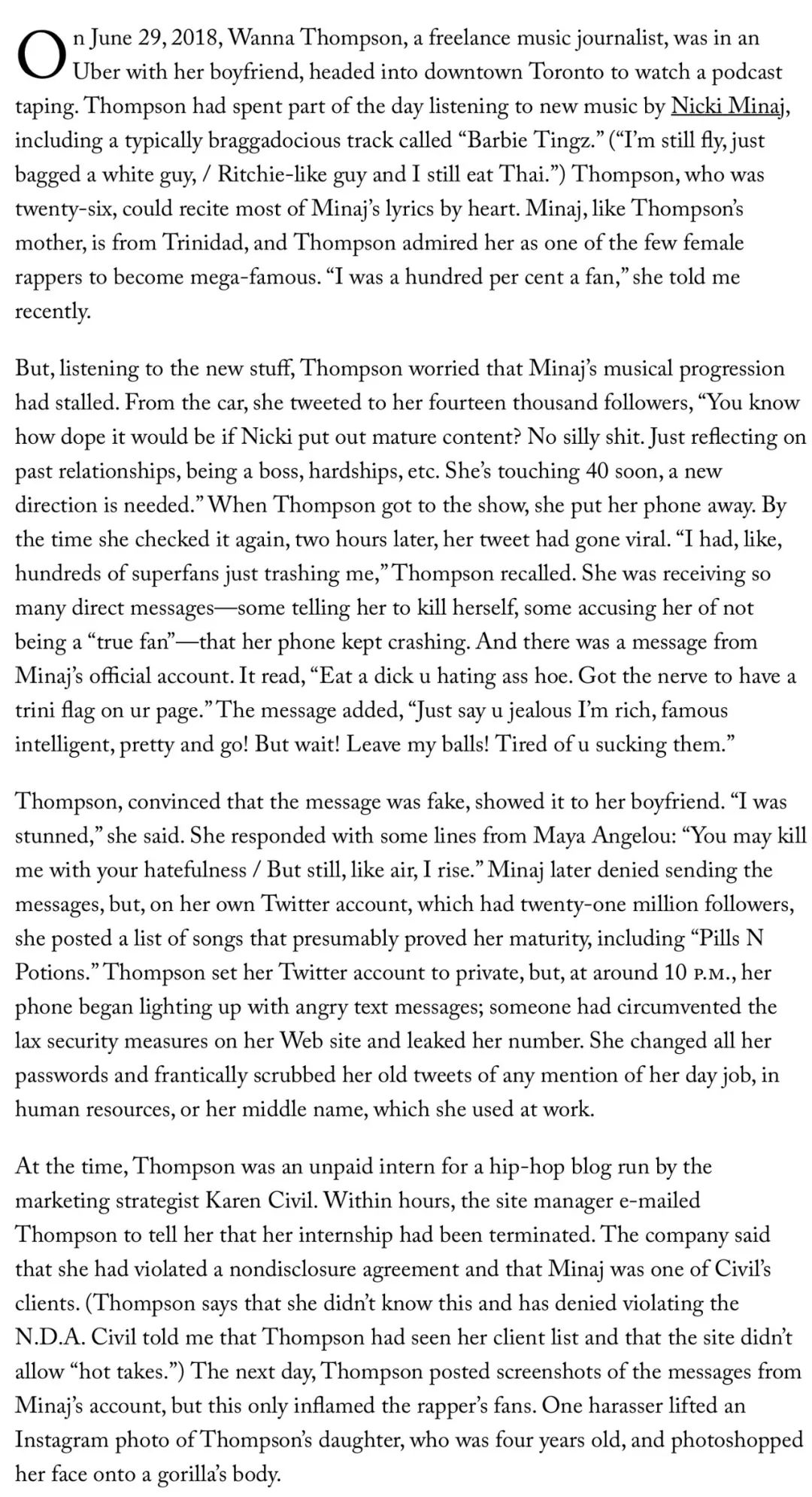
故事引入部分描述了一位“攻击”Nicki Minaj 后沦陷的博主
Like most music idols, Minaj has a hardcore fan base with a collective name, the Barbz; Beyoncé has the Beyhive, Justin Bieber the Beliebers, and Lady Gaga the Little Monsters. The most fervent among them are called “stans.” The term derives from a 2000 track by Eminem, in which he raps about a fictitious fan named Stan (short for “stalker fan”), who becomes so furious that Eminem hasn’t responded to his letters that he drives himself off a bridge with his pregnant girlfriend in the trunk. Unlike regular fans, stans see themselves as crusaders, pledging loyalty and rushing to their idol’s defense against dissenters. Thompson was on the receiving end of a maneuver known as the clapback, in which a star actually responds to a lowly hater. Like Queen Victoria’s cavalry, the stans follow suit and attack.
每个粉丝团都有自己的团名,铁杆的粉丝有个别名叫 stans
“When it comes to stans and how they operate on social media, it’s crazy to witness,” Thompson told me. “These people really think that they’re doing some due diligence by the celebrity.” More than a year later, she continues to receive messages from angry Barbz. She ended friendships with people who she says didn’t defend her online, and she no longer listens to Minaj’s music. “I felt very weird when this whole thing happened,” she said, “because I was such a huge fan of hers.”
A glance around the pop-culture landscape gives the impression that fans have gone mad. In May, viewers of HBO’s “Game of Thrones” revolted against the show’s final two episodes, in which the dragon queen, Daenerys Targaryen, took a turn toward the genocidal. Some critics accused the showrunners, both of whom were men, of propagating the idea that women in power are inevitably crazy. Others complained that the personality change was too implausible, or that the whole season was rushed, or that it simply sucked. More than 1.7 million people signed a petition on Change.org to “remake Game of Thrones Season 8 with competent writers.” At a press conference, HBO’s programming president, Casey Bloys, turned down the request, though he acknowledged the fans’ “enthusiasm and passion.”
The outcry bore similarities to the fan uprising against “Star Wars: The Last Jedi,” released in 2017. Much of the backlash had to do with Luke Skywalker not acting quite like Luke Skywalker, now that he had rematerialized as a sour middle-aged hermit. Like Daenerys, he wasn’t the hero that fans had long held him to be. Some fans were also mad that Rey, the orphaned heroine, was revealed not to be secretly of noble lineage, undercutting two years of carefully worked-out fan theories. Detractors swarmed Rotten Tomatoes, posting bad reviews, and petitioned Disney to strike the film from the “official canon.” (Again, no dice.)
Some of the crankiness had a Trumpian cast. Many of the new “Star Wars” characters were women and people of color, and the Asian-American cast member Kelly Marie Tran was harassed online so violently that she quit social media. The episode echoed previous fan wars such as Gamergate, in which male video-game fanatics targeted feminist gamers, and the troll campaign against the all-female “Ghostbusters” remake and its black star, Leslie Jones.
Most people are fans of something, whether it’s the Red Sox, “Hamilton,” or Agatha Christie. But the nature of fandom seems to have morphed in the past decade. In the old days of sci-fi conventions and Bobby Sherman fan clubs, fandom was a subculture reserved for the very young or the very obsessed—or, in the case of the Grateful Dead, the very stoned. As fantasy and comic-book franchises have taken over the entertainment industry, nerd culture has become mainstream. Now that couch potatoes have social media, they have risen up and become active, opinionated participants. As a result, movie studios and TV showrunners have to cater to subsets of diehard devotees, who expect to have a say in how their favorite properties are handled.
由于社交媒体的出现,原先属于亚文化subculture 的粉丝变得越来越主流,一定程度上也使得大IP 的翻拍越来越盛行。
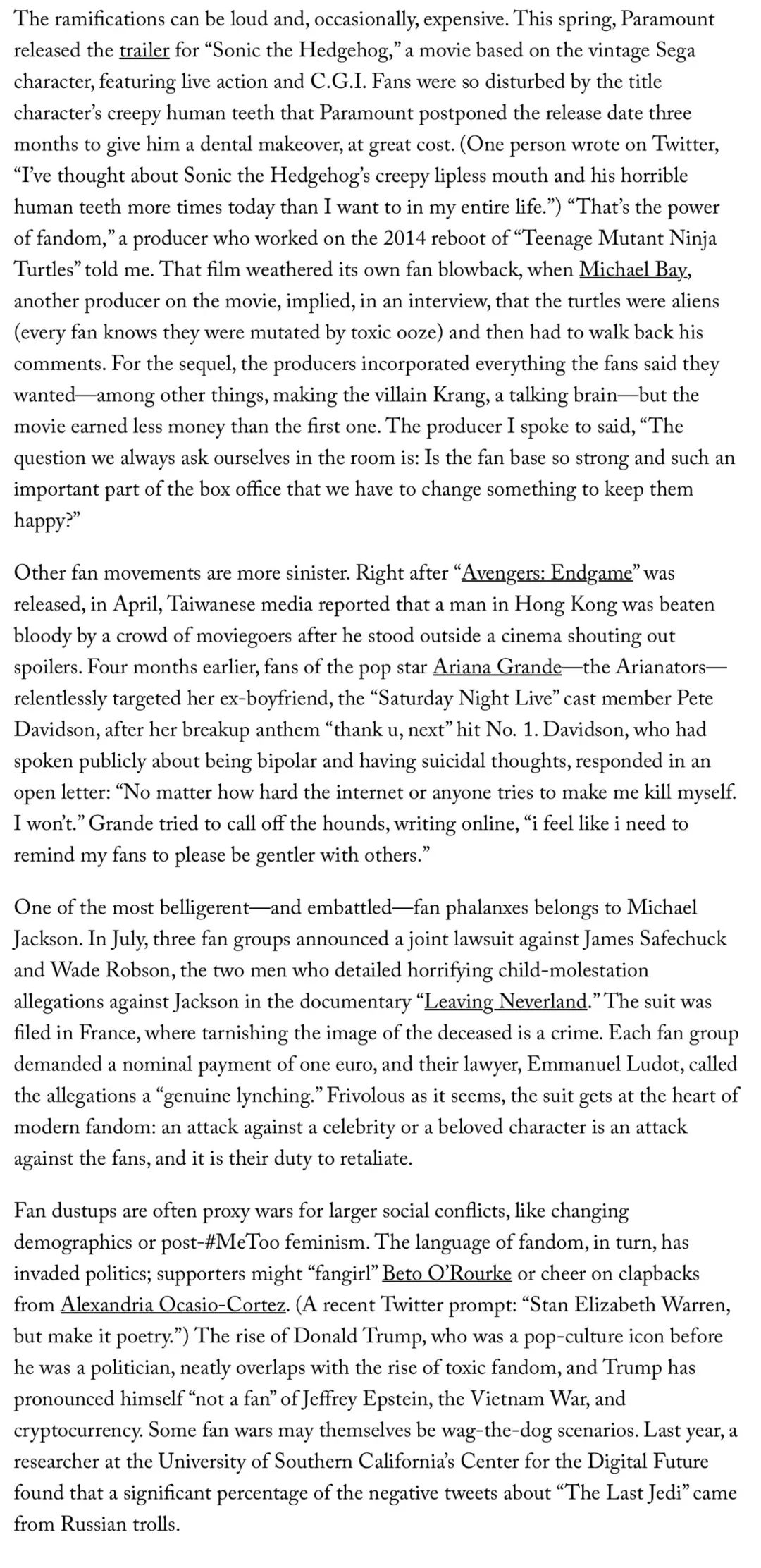
粉丝文化带来的种种影响(ramifications 类似于results 的意思)
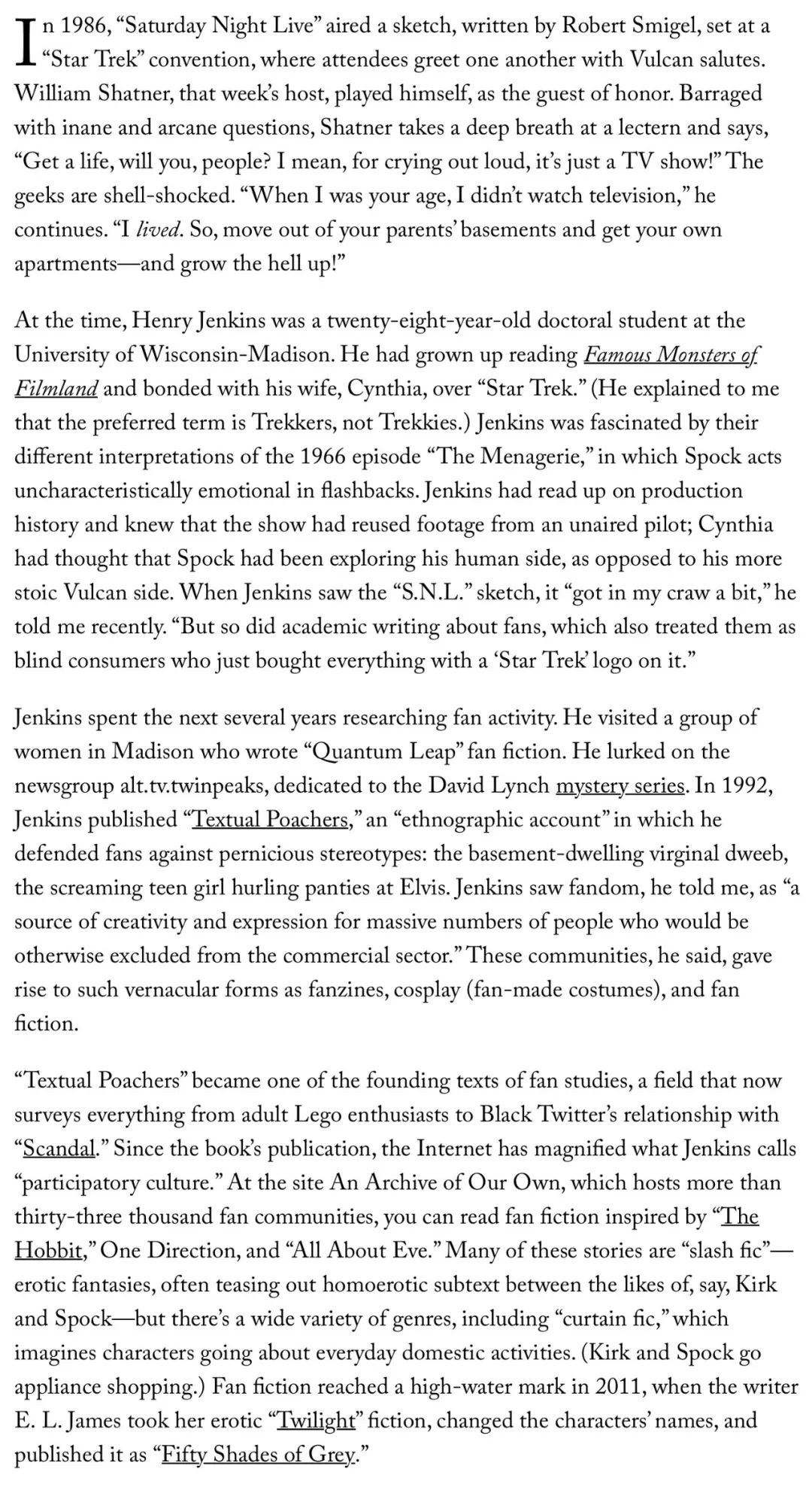
一度被认为是盲目消费群体(blind consumers), 但学术圈也有认真研究者。
Fandom, Jenkins told me, is “born out of a mix of fascination and frustration. If you weren’t drawn to it on some level, you wouldn’t be a fan. But, if it fully satisfies you, you wouldn’t need to rewrite it, remake it, re-perform it.” Nowhere is Jenkins’s constructive view of fandom more evident than at Comic-Con International, in San Diego. Comic-Con started as the Golden State Comic Book Convention, in 1970, attracting some three hundred people. It’s now a four-day bonanza attended by a hundred and thirty-five thousand fans of all stripes, many of whom show up in elaborate cosplay. When I arrived at this year’s edition, in July, I started seeing Spider-Men five blocks from the convention center. Near the entrance, a group of Christian protesters—the oldest fandom, really—was yelling, “The Syfy channel cannot save your soul!” I turned around and saw a guy dressed as Lumière, from “Beauty and the Beast,” shrugging at me with candlestick hands.
不管是粉某个个人还是粉某个作品,都是开始于难以自拔(drawn),接着就是爱恨交加,五味杂陈(fascination and frustration)

“Fan” is short for “fanatic,” which comes from the Latin fanaticus, meaning “of or belonging to the temple, a temple servant, a devotee.” The vestal virgins, who maintained the sacred fire of Vesta, the goddess of hearth and home, were the Beyhive of their day. But “fanatic” came to be associated with orgiastic rites and misplaced devotion, even demonic possession, and this may explain why fan behavior is often described using religious terms, such as “worship” and “idol.” (One Trekker at Comic-Con told me that the show “replaced religion for a lot of people.”)
Fan 从词源上来说,就有些宗教感

19/20世纪也有粉丝文化
Science-fiction fans, who have always been at the forefront of fandom, started meeting at conventions in the nineteen-thirties. The World Science Fiction Convention, which began in 1939, in conjunction with the World’s Fair, still exists, as WorldCon. (The 2019 edition was just held, in Dublin.) “Star Trek” fandom, in the late sixties, was a breakthrough. When NBC threatened to cancel the show, fans organized a letter-writing campaign and kept it on the air. The show ended after its third season, but it had aired enough episodes to qualify for syndication, allowing the viewership to expand throughout the seventies. The first major “Star Trek” convention was held in 1972, when some three thousand Trekkers gathered at the Statler Hilton hotel, in New York, under a banner that read “Star Trek Lives!”
粉丝文化的前排要属科幻小说迷
Rock and roll dragged Lisztomania into the twentieth century, as Elvis Presley fans swooned and screamed—a phenomenon immortalized in the title of his 1959 compilation album, “50,000,000 Elvis Fans Can’t Be Wrong.” Beatlemania further crystallized the image of the screaming female fan. An underappreciated aspect of the band’s appearance on “The Ed Sullivan Show,” in 1964, is that it spotlighted not just the Beatles but the hysterical audience. The “screaming teen” stereotype has often inspired hand-wringing or contempt, a way of policing adolescent-female libido. The fan scholar Mark Duffett has suggested that “fan screaming may be a form of ‘affective citizenship,’ ” a communal defiance of ladylike behavior.
20 世纪,最狂人的是摇滚粉
Like television, the Internet broadened and intensified fandom. When Jenkins published “Textual Poachers,” digital fandom was “mostly guys at M.I.T. and military bases typing ‘Star Trek’ into computers while at work,” he said. Nineties shows such as “The X-Files” and “Buffy the Vampire Slayer” spawned passionate fan communities that used the Web to gather, complain, or hunt for romantic subtext. (“Shippers” are fans who, often disregarding narrative logic, advocate for certain characters to couple up.) But stronger fandoms meant a stronger sense of ownership, which could put writers and producers on the defensive. The ABC show “Lost,” which ran from 2004 to 2010, inspired elaborate theorizing about its mysteries, and fans revolted when the finale didn’t deliver answers. One of the showrunners, Damon Lindelof, later lamented the conflicting demands of viewers: “There were things that they wanted, but they also wanted to be surprised.” Millions of dollars ride on the contradiction.
媒体不管是传统的电视,还是现在的互联网,让粉丝文化慢慢主流
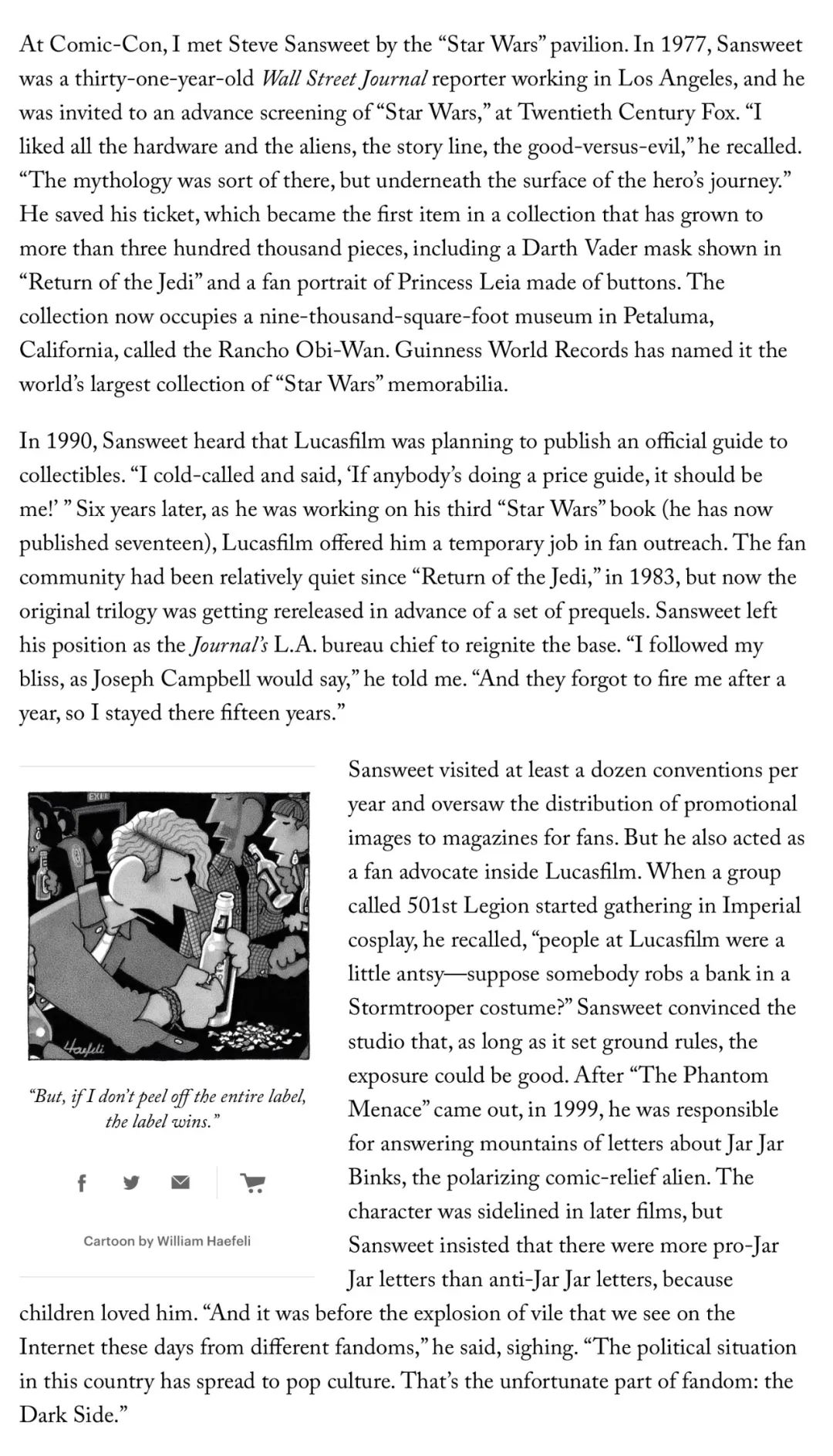
When I was a teen-ager, in the nineties, I was obsessed with NBC’s Must-See TV lineup on Thursday nights, anchored by “Friends,” “Seinfeld,” and “ER.” Every week, I would go to my friend Charles’s house to watch. I especially loved Phoebe, Lisa Kudrow’s character on “Friends.” The first Web site I ever visited was called Phoebe’s Songbook, a fan collection of her lyrics. (I had read about it in Entertainment Weekly.) In tenth grade, I owned branded T-shirts for all three shows, and on Friday mornings I would go to school wearing the shirt corresponding to whichever show I thought had been the best the night before.
In retrospect, this is probably the most embarrassing fact I can share about my high-school years, but at the time I felt more secure in this aspect of my identity than I did in many others. The shirts were my Twitter. My fan community was Charles and me. There was something pure about my fandom, an unabashed teen longing that didn’t know to hold back. Had I waited twenty years, I would have been able to connect with a vast network of Phoebe stans. Thanks to streaming, “Friends” fandom remains a global phenomenon, particularly among millennials, who are apparently nostalgic for a world in which friends interacted over coffee instead of on Instagram. At Comic-Con, people lined up at the Warner Bros. pavilion to pose on a replica of the Central Perk sofa.
粉一个人,或者一个作品,大多数还是出于一种身份认同
As I walked through the hall, I found myself thinking less about the negative side of fandom than about its benefits. At its core, fandom is a love story, like something out of Greek myth; it’s Pygmalion falling in love with someone else’s statue. Like romantic love, it can range from gentle companionship—cosplay and curtain fic—to deranged obsession. The psycho stalker fan is its own archetype—Robert De Niro’s Rupert Pupkin, in “The King of Comedy,” or Kathy Bates in “Misery,” based on the 1987 Stephen King thriller, about a romance-novel fanatic named Annie Wilkes, who kidnaps her favorite author and makes him tailor his latest novel to her liking.
可能每一个粉都是一段关于爱的故事,只是有时候会如此沉溺于这段爱的故事,以至于把周围人都敌对起来了
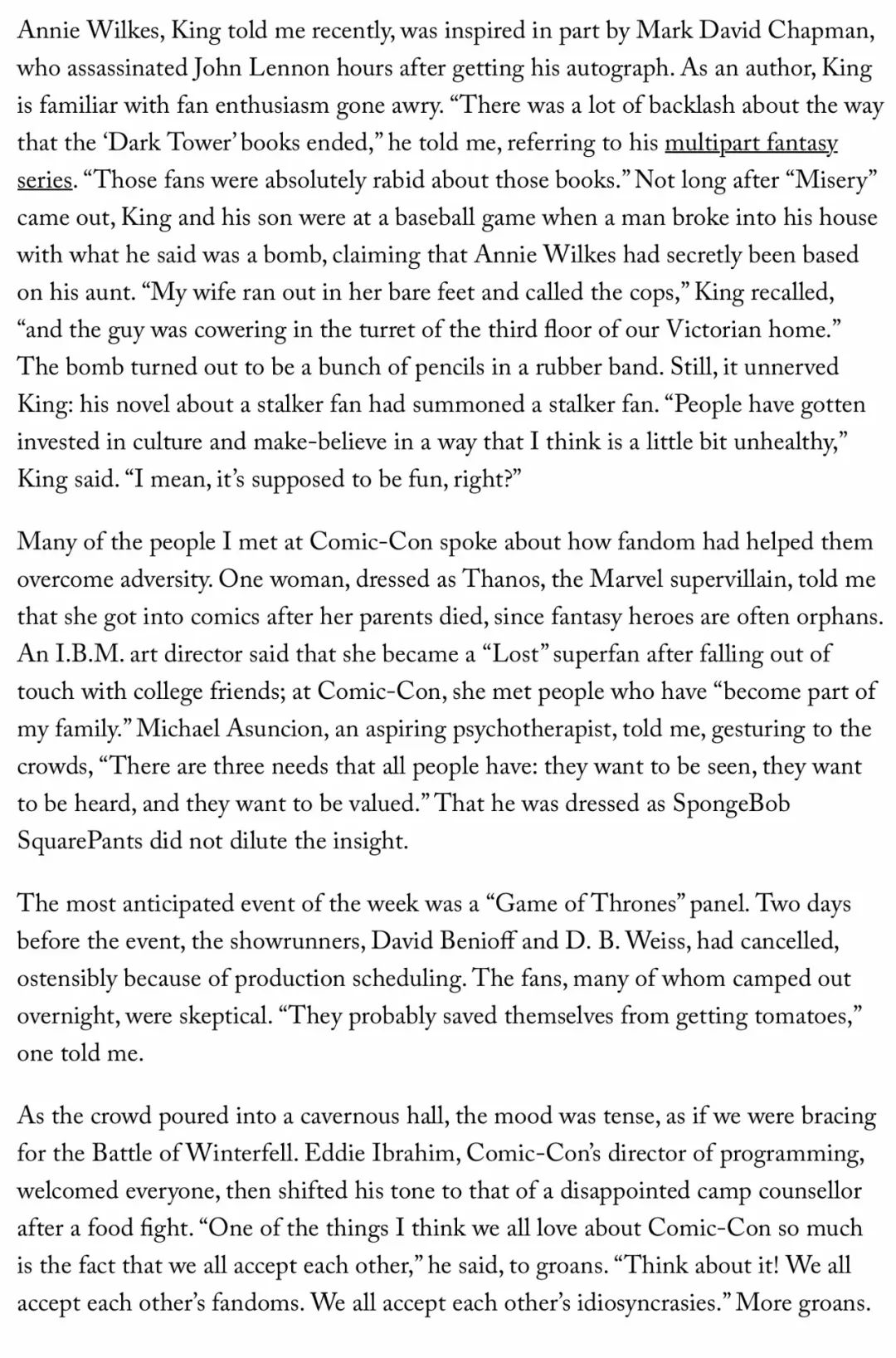
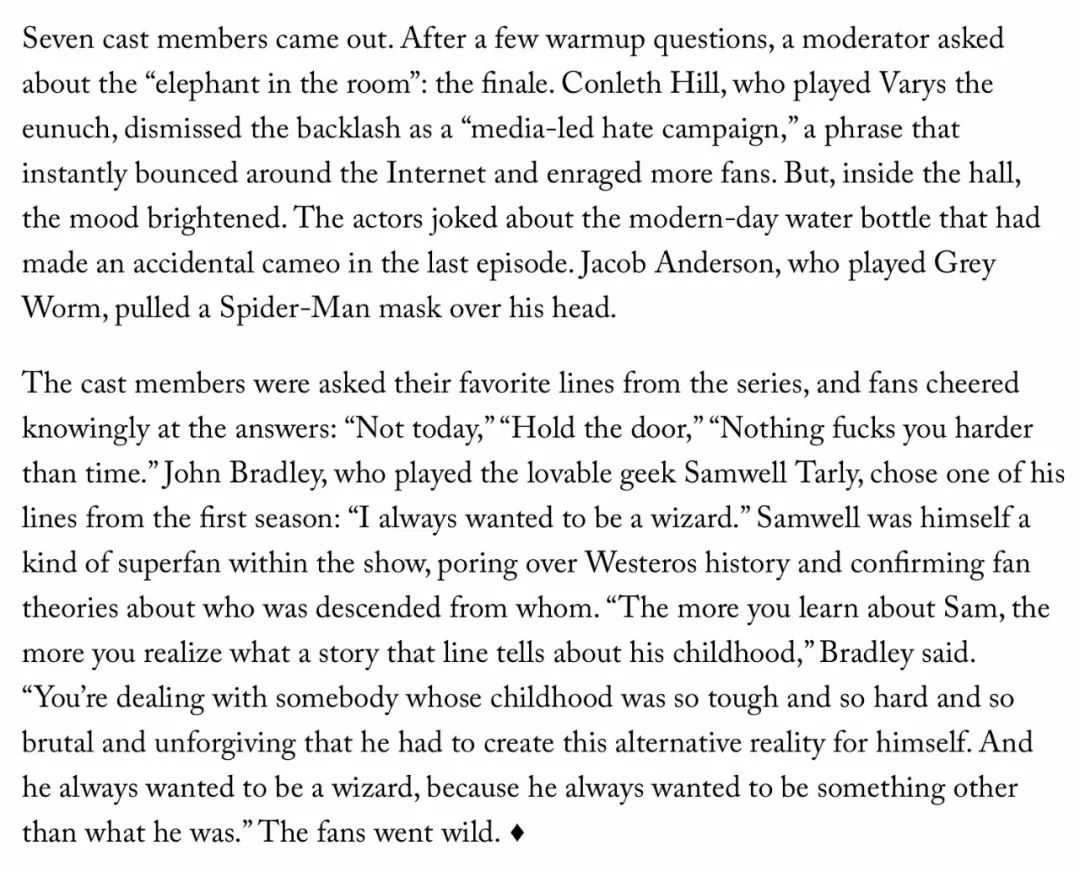
读一手文字,不看二手观点

本文源自微信公众号:LABcircle
